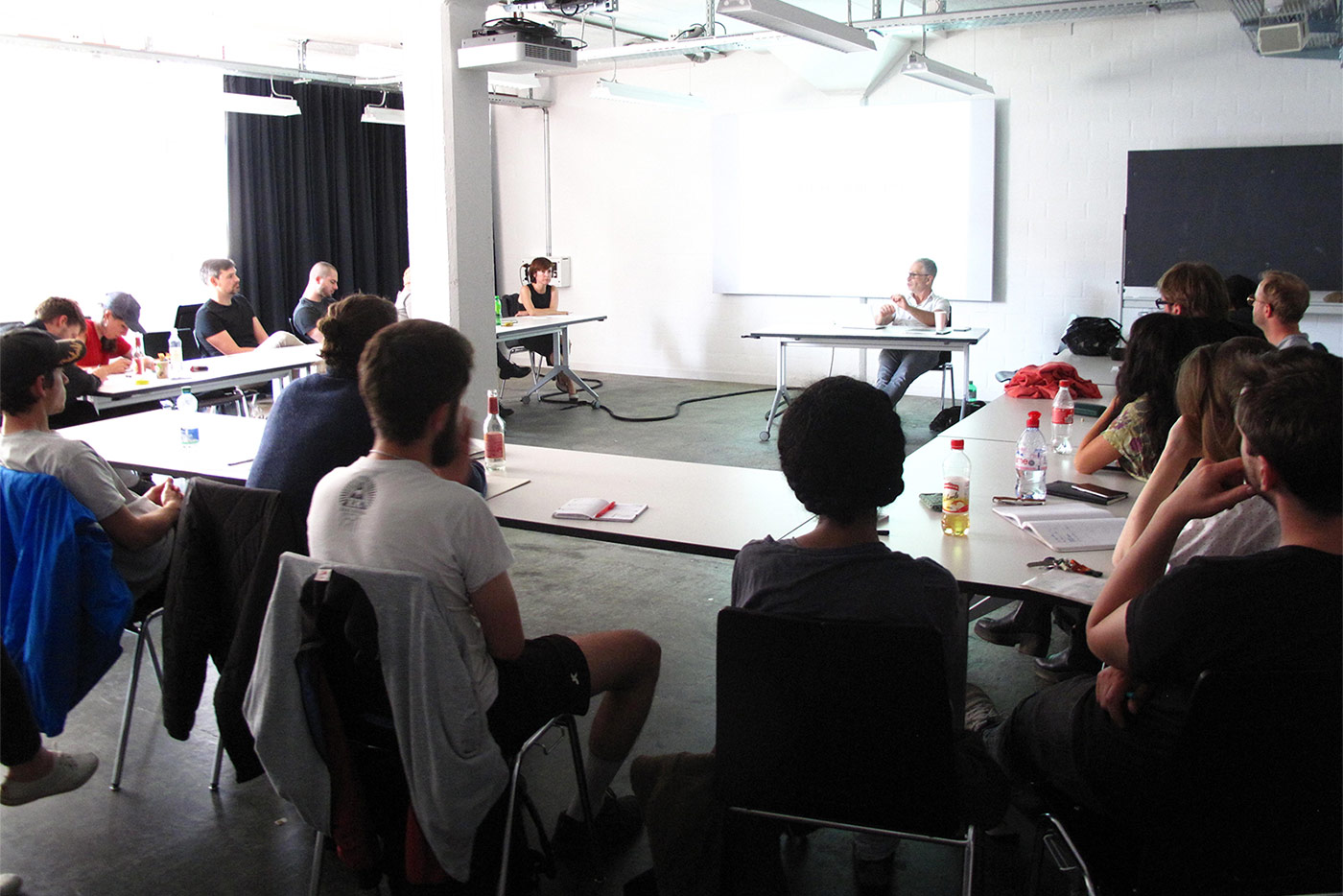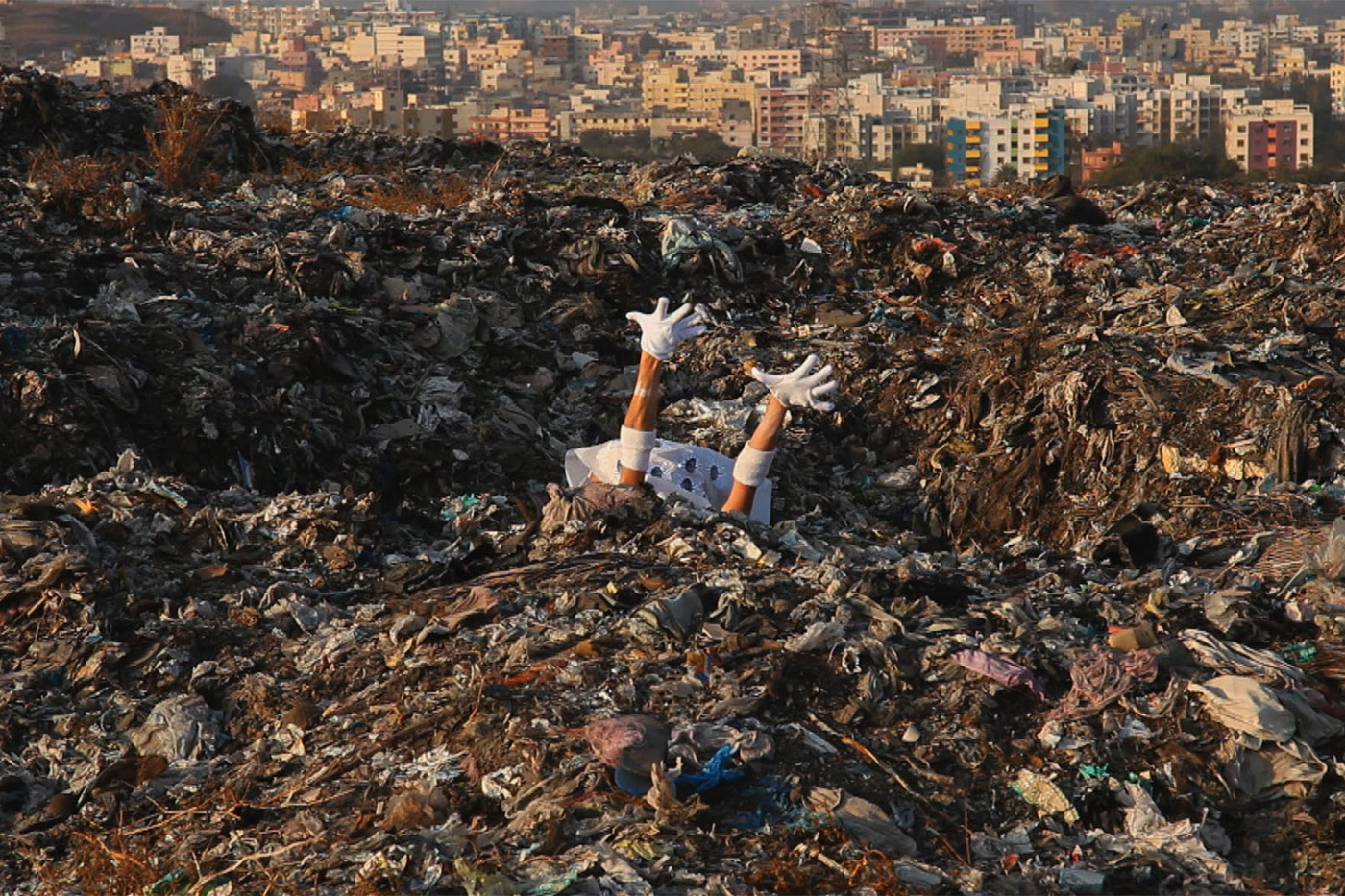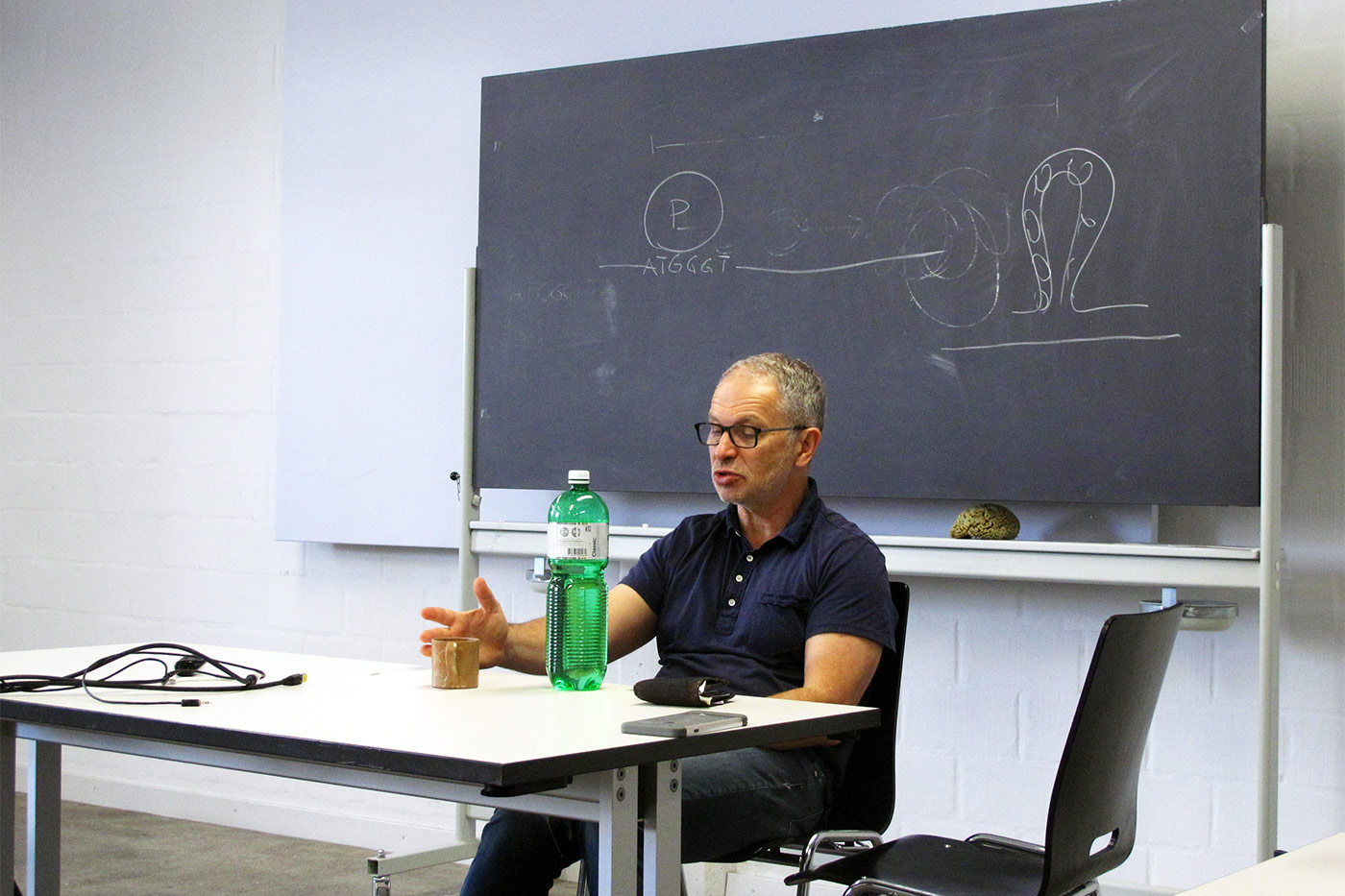THE NEXT SOCIETY
Seminar Kunst & Wissenschaft
Wir nehmen ein Projekt in Angriff das die Absicht verfolgt, Wissenschaftler und Wissenschaften im Zentrum des Instituts Kunst zu installieren. Wir werden es The Next Society nennen. Das ist ein Zitat aus einem Buch, welches der Soziologe Dirk Baecker verfasst hat, der ebenso unser Freund wie Gastwissenschaftler am Institut ist. Wir beginnen nun damit, dieses Programm detailliert auszuarbeiten, das zu einer Art kontinuierlich besetztem Lehrstuhl werden soll, der durch eine ganze Reihe von Gastvorträgen bespielt wird.
Die Zusammenarbeit zwischen Künstlern, Ingenieuren und Wissenschaftlern hat eine lange Tradition; und am Institut Kunst in Basel – hier und heute – wollen wir diese Geschichte wieder aufleben lassen. Wir wollen uns mit Zeit, Materie, Leben, Information, Position, Ausstellung und Darstellung, Struktur, Wirklichkeit, Erfahrung, Lust, Bewusstsein, Intelligenz, Sinnlichkeit und vielem anderen mehr auseinandersetzen und uns diesen Fragen stellen. Wir wollen einen Boden bereiten, von dem aus zwei Gemeinschaften – die der Künstlerinnen und die der Wissenschaftler – Fragen entwickeln und Fragestellungen ausarbeiten können, die für die Zukunft des Wissens von Bedeutung sind. Es geht um die Schaffung eines Umfelds, welches das Experiment mit der Spekulation ermöglicht.
Das Programm wurde durch die Unterstützung der Schering Stiftung, Berlin, möglich gemacht.
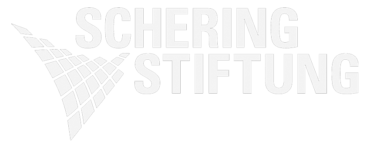
ART & SCIENCE
Seminar – Autumn 2017
Part I: 4 – 5 October, 2017 / Part II: 23 – 24 November, 2017
With Chus Martínez and Filipa Ramos, Eduardo Navarro, Vincent Normand, David Pearce
This seminar has been continuously dedicated to inquire into what art and science share. Both are dedicated to asking the big questions placed before us: «What is true? Why does it matter? How can we move society forward?» Both search deeply, and often wonderingly, for these answers. We know that the scientist’s laboratory and the artist’s studio are two of the last places reserved for open-ended inquiry, for failure to be a welcome part of the process, for learning to occur by a continuous feedback loop between thinking and doing.
ON NATURE, RACE AND GENDER
Master Symposium – Spring 2017
9 – 11 May, 2017
With Chus Martínez and Filipa Ramos, Tejal Shah, Trevor Paglen, Ingo Niermann, Natascha Sadr Haghighian
For the past two years, the Art Institute in Basel developed its program around three crucial issues: Nature, Gender, and Race. But what does this mean exactly? Do we need to treat these notions as subjects, and create a «theme» so that they can be accounted for in the practice? Or, on the contrary, should we understand them more like substances that nourish the way we think—or should think—about art’s complex relationship with coevolution, the possibility to overcome the gender binary, and the possibility to achieve social equality? There are no simple answers to these questions, and every artist deals with them differently. Even if you simply avoid them, you «deal» with them. Therefore, we have decided to divide this symposium into two parts: one is a conference and another is two days of practical workshops with artists Tejal Shah and Natascha Sadr Haghighian.
ART & SCIENCE
Seminar – Spring 2017
Part I: 22 – 23 March, 2017
Chus Martínez with David Gruber and Filipa Ramos
Part II: 27 – 28 April, 2017
Chus Martínez with Volker Sommer, Marcus Coates, David Gruber and Filipa Ramos
This seminar has been continuously dedicated to inquire into what art and science share. Both are dedicated to asking the big questions placed before us: “What is true? Why does it matter? How can we move society forward?” Both search deeply, and often wonderingly, for these answers. We know that the scientist’s laboratory and the artist’s studio are two of the last places reserved for open-ended inquiry, for failure to be a welcome part of the process, for learning to occur by a continuous feedback loop between thinking and doing.
ON PASSIONATE CURIOSITY
Symposium – Autumn 2016
8 – 9 November, 2016
With Michael D. Linares and Hinrich Sachs
A two day symposium with artists Michael. D. Linares and Hinrich Sachs on the structure of curiosity and its role in artistic research.
Artistic research has become the talk of town, however very few words are wasted on curiosity. This year, departing from the most quoted quote of Albert Einstein „«I have no special talents, I am only passionately curious» the symposium will be guided by two artists interested on this question: Michael D. Linares and Hinrich Sachs. If last year, we developed a first and very intense series of presentations/speculations on the notion of innocence, this year we decided to revolve around curiosity. Curiosity seems an obvious and necessary trait to «stat», but its force is the fundament of motivation and motivation the key of a constant activity of the mind. Different from the most religiously and corporative touched notion of «engagement», curiosity does not marry the subject, it is all about courtship.
INNOCENT FORM OF INTELLIGENCE
Seminar – Autumn 2016
Part I: 13 – 14 October, 2016 / Part II: 1 – 2 December, 2016
With Filipa Ramos and Julieta Aranda. Guests Dr. Rory Rowan, Mathilde Rosier, Paul Broks
Dieses Seminar wird von Filipa Ramos, Julieta Aranda und Chus Martínez geleitet und wird als Reihe fortgesetzt. Zu Gast sein werden die Künstlerin Mathilde Rosier und der Neuropsychologe und wissenschaftlicher Autor Paul Broks. Absicht der Veranstaltung ist die Diskussion von Ideen, die hinsichtlich tierischer und menschlicher Intelligenz entwickelt wurden; zusätzlich liegt ein weiterer Schwerpunkt auf der Reflexion darüber, welche Bilder von den Wissenschaften geliefert werden, wenn diese illustrieren, wie das Gehirn funktioniert.
ART & SCIENCE
Seminar – Spring 2016
20 – 22 March, 2016
With Filipa Ramos
This presentation addresses the subject of animal embedment through the analysis of three artistic representations of tiger-human encounters. It observes three case studies, Heinrich Leutemann’s lithographic print Road Surveying Interrupted in Singapore (c. 1885), Apichatpong Weerasethakul’s film Tropical Malady (2004), and Phillip Warnell’s film Ming of Harlem (2014), to investigate the speculative constitution of the animal’s relation to territories and boundaries. Taking in consideration the various relations that these animals establish with the sets where they are situated and with those who traverse them—how Road Surveying Interrupted in Singapore depicts a leaping tiger surprising an urban planner and his team; how in Tropical Malady a were-tiger haunts his feverish lover across the jungle; and how Ming, the Bengal tiger, defends his house/den from a menacing police officer—it observes how these animal-images are traversed by an anthropocentric gaze that assigns specific tasks to them while they still manage to evade these sites of control and exist in blank spots.
ON INTELLIGENCE
Master Symposium – Spring, 2016
21 – 23 March 2016
With Mike Alonzo, Nabil Ahmed and Chus Martínez
The Master Symposium will be dedicated to intelligence. Intelligence: what does this mean? For a long time, the talk was about the difference between art theory and practice. For many years now we are trying to see how art is different from the social function that art plays in the social. The term „artistic research“ was coined to signalize how artist produce not only objects or performances or act inside a given media but propose a «research» into the practice of art itself. However, very soon the term named a new form of academic activity performed by artists.
This symposium will try to interrogate how artists today are relating their practice to fundamental questions of how life is and takes place, how the futures are shaped by experience and how art is defining experience under a total new form. This symposium, in other words, will try to familiarize you with current debates in art thinking.
ART & SCIENCE
Seminar – Spring 2016
Part I: 7 – 8 April, 2016 / Part II: 9 – 10 June, 2016
With Hans-Jörg Rheinberger, Julieta Aranda and Alexander Tarakhowski
This seminar is part of the Next Society, Art and Science program. Expect to continue with the questions we have been dealing till now: the surpassing of modern forms of perception; the expansion of traditional ideas on attention; the new relations art is establishing with new forms of intelligence etc.
ON INTELLIGENCE AND ART
Seminar – Autumn 2015
23 – 24 November, 2016
With Dr. Marta Moita and Filipa Ramos
One of the main subjects of the next two years is how art can learn from the new developments in science regarding experience. Historically speaking, man has had a privilege position regarding experience. Animals cannot talk about how they perceive the world, however, new research is becoming eloquent and key in discovering not only different ways of perception but how this also affects socialization. Filipa Ramos has been long interested in this subject matter and has particularly followed the work of Marta Moita, neurologist. Martas lab has been focused on social interactions in different contexts, namely when individuals perceive a threat or when they are foraging for food. The neural mechanisms by which animals use social information to detect impending danger are largely unknown. We are studying how animals use defensive behaviors of con-specifics as alarm cues. In addition, we study how the social context modulates defense behaviors. For example, we are studying how the presence of offspring affects defense behaviors displayed by mothers. We are also studying pro-social behavior of rats using food foraging tasks.
INNOCENCE
Symposium – Autumn 2015
27 October, 2015
With Chus Martínez, Filipa Ramos, Diego Blas, Kenneth Goldsmith, Natascha Sadr, Adam Thirlwell and Boris Groys
The notion of innocence is not an easy one. Already at first sight one is confronted with a certain uneasiness. How can we propose a term like this in a time like ours? On the other hand, how can we not appeal to a notion like innocence in thinking about the status-quo of the discourses on political and cultural identity, or on the very nature of theory—that recurrence to the same critical paradigms? We already know that is not only culture that should define thinking, but also new thinking forms, which are emerging from nature or animal studies or science and art.
NEW FORM OF UNDERSTANDING THEORY
Symposium – Autumn 2015
Part I: 15 – 16 October, 2015 / Part II: 10 – 11 December, 2015
With Miguel Soares, Julietta Aranda and Chus Martínez
We invited Miguel Soares the head of research lab, at the Gulbenkian Institute and Julieta Aranda, an artist that lives in Berlin and New York. This first seminar is crucial for us. The two-day seminar is meant as an introduction to a debate on nature, on artistic practice, on gender that affects traditional ways of understanding the relationship between art and political and social theory. We are facing a rising interest in texts and debates that address natural and species co-evolution, but also forms of intelligence that re-address our position as «humans» versus nature, but also our relation to technology. Art and artists are showing not only interest in this turn, but a capability in showing how these ideas affect and expand aesthetics, notions of materiality, the body and gender. We will show examples and we will propose texts to read that will serve as preparation fort the October CH-Pool Symposium on Innocence and the November Symposium on Intelligence and Animal Studies.

